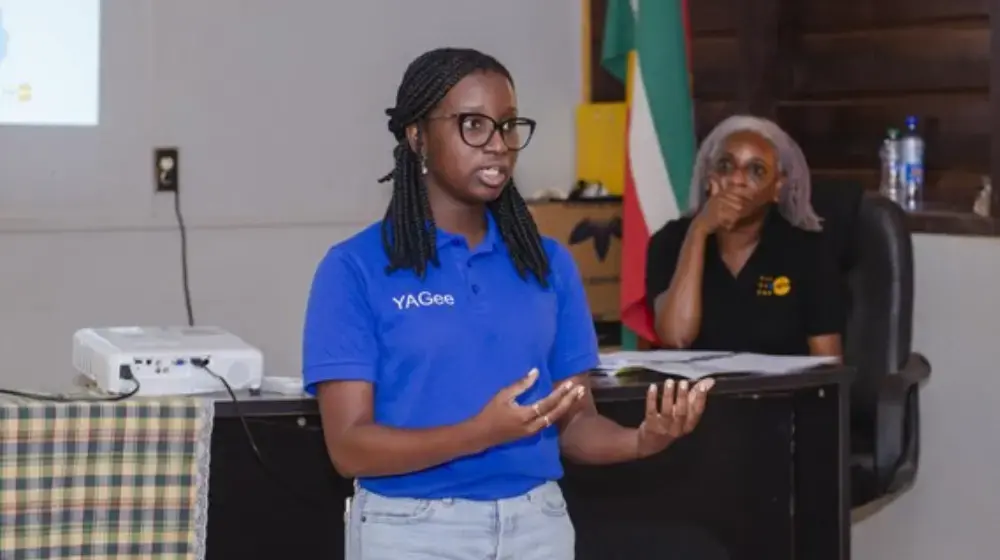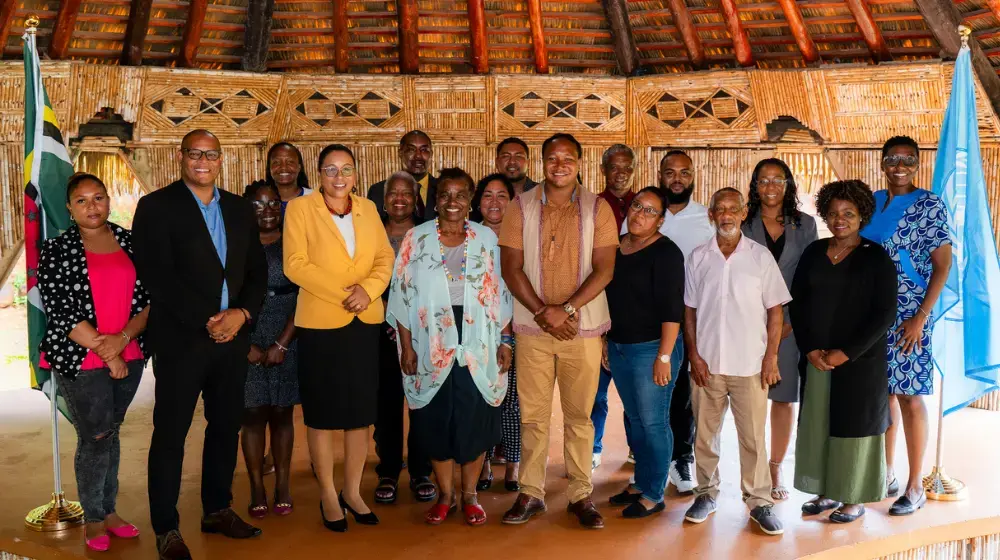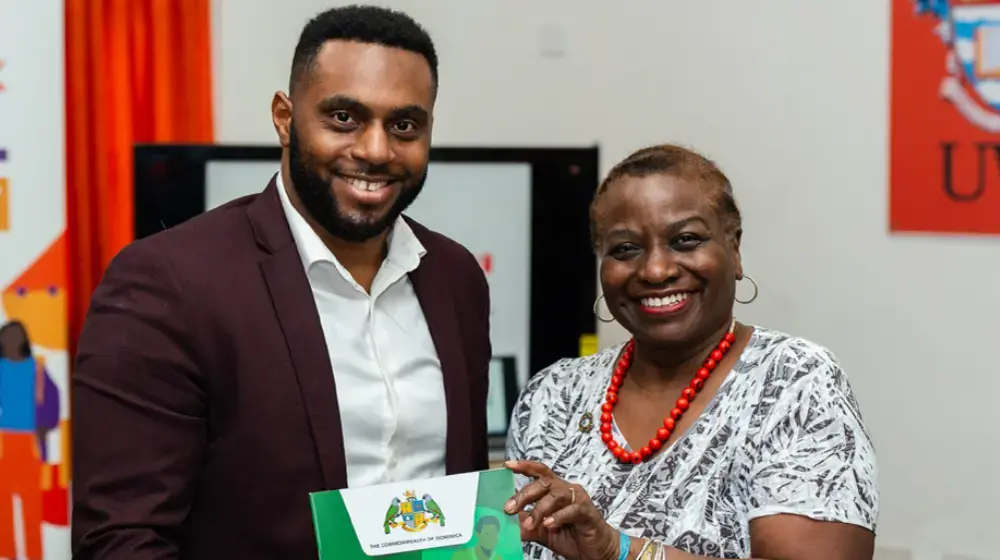Launch of Youth Connect T&T
Feature Address by Her Excellency Reema Carmona, First Lady of Trinidad and Tobago
St. Anthony’s College, Port of Spain, 3 July 2017
I look around me here this morning and I see the bright, vibrant faces of the world’s future. I see ‘Generation Hope’. You are each, one of the 1.8 billion people between the ages of 15 and 29 in the world today, of whom some 87% live in developing countries. The statistics are staggering and yet, encouraging. You represent what our tomorrow will manifest. My greatest hope for your generation is that your full potential, in whatever field of endeavor you constructively engage, will never be compromised by the myriad, novel challenges that inform your daily lives, on a level that my generation never experienced. We live in an era of widespread crime, HIV sexually transmitted diseases, STD’s and rampant teenage pregnancies.
Any measure therefore, to sensitize, educate and curb the proliferation of these social ills, which affect Generation Hope is as welcome as it is necessary. That is why I was pleased when the Marriage Amendment Act was assented to just last week by His Excellency the President, making it unlawful for a child under the age of 18 to marry. It is a good day in Trinidad and Tobago when we can stand up and end the long, sad history and trauma of child marriages in this country. It means we are one step closer to ensuring healthy lives and promoting the well-being of all our people, including our vulnerable minors, as set out in the United Nations’ Sustainable Development Goals.
As part of the First Ladies Network of the Caribbean, which has undertaken to champion the causes of the ‘Every Caribbean Woman, Every Caribbean Child’ initiative of the United Nations, I stand in support of all positive projects that seek to mitigate against adolescent pregnancy, mother to child transmission of HIV and other health and social issues, which impact negatively on our young people. The launch of an App that addresses issues of sexual and reproductive health in our young people is therefore a most laudable initiative and the UNFPA must be commended. It represents another strategic project in support of the Global Strategy for women, children and adolescent health 2016-2030.
The necessity of a mobile app that connects with our Nation’s youths on matters of Comprehensive Sexual Education, must be underscored, as sex education and sexual reproductive health are still taboo topics in Trinidad and Tobago, spoken still in hushed, embarrassed tones or indeed, not spoken of at all. The conservative, traditional views, embedded deep in our Caribbean culture, as to how sexual relationships ought to develop among our youth, are very often out of sync with the realities at ground zero. When it comes to sexual education, parents generally hope for the best for their child but it requires- no it demands, rather- a new, practical and proactive approach to address the rising statistics on HIV, sexually transmitted diseases (STD’s) and teenage pregnancies. Reality television shows and certain internet “celebrities” continue to simplify life into reckless ‘one-night’ stands and transient relationships, dispensable and without individual responsibility. Yes, this is the reality of what our 15 to 24 year olds are influenced by and practice. This Youth Connect T&T App is therefore a response to the crisis within, because hoping for the best no longer works and really, did it ever?
Through this App, UNFPA has created the framework, but a principal stakeholder- the Ministry of Education- must consider giving this project the required push it needs, by providing programs, which educate and inform young people about the App, its uses and benefits. For far too long we have approached human sexuality and sexual reproductive health from a reactive posture. The sexual and reproductive health of young people have not been addressed effectively. Our young women need to be empowered to know that even if they have been involved in early sexual initiation and may have become pregnant, that cycle of irresponsible sexual conduct and teenage pregnancy need not be a revolving wheel. Young people need to be alert to the real possibility of living sustainable, healthy and satisfying lives. Sex education does not encourage young people to have sex but rather helps encourage our young people to delay sexual initiation and make informed life decisions. This App therefore represents the hope of better choices for you, boys and girls- an avenue of refuge if you feel peer pressured, taunted or simply, helpless or threatened in any situation concerning your sexual and reproductive health and well-being. Indeed, this App may well have helped that 13 year old girl living in a rural area in East Trinidad, whose plight of sexual abuse and violation, remained a secret from the police and authorities, until last week when she walked into a Health Centre with her dead 6 month old baby. A child was being abused; she was probably screaming for help, and yet, no one heard. I am hopeful that the Youth Connect T&T App may well be able to save the next little girl from abuse, once she is able to access the advice and other responsive services, which the App is intended to provide.
But indeed, “access” itself presents its own challenges. There are those among us who argue that the less time children spend on the internet, the less influenced they will be by negative and unsavory sexual practices. Of course, excess has its pitfalls- we all know the saying repeated on far too many occasions, by our mothers and grandmothers, “too much of one thing is good for nothing.” In this regard however, the Education Policy Institute (EPI) of the United Kingdom found that limiting time online did not necessarily have the impact of protecting children. The report by the EPI Director of Mental Health, Emily Frith, stated, “restricting a child’s use of the internet reduces the chances of children meeting difficulties online but does not give them the skills to deal with problems they may run into at a later date. It could inhibit the development of the skills needed to handle online risks”. The Office of National Statistics (UK) suggests that 56% of 10 to 15 year olds spend 3 or more hours online on a normal school day- they use social media at school, to and from school and at home. These figures are by no means unique to the United Kingdom, as I suspect the average Trinbagonian youth probably spends as much as, or even more time, online, as his UK counterpart. The internet, when utilized responsibly is a wonderful tool of enlightenment and education. As a parent of 2 teenagers, my duty to my children is not to stifle their ability to be informed and educated by way of the internet, but rather to monitor and guide the content of their internet browsing. This is exactly what the EPI Report (UK) concluded- that parents must be empowered about the best ways to safeguard and support their children online.
As the Youth Connect T&T App finds a place with the youths of Trinidad and Tobago, so too must the parents also come on board, with a view to creating the support mechanisms for their children to access and tap into the services of the App. Ladies and gentlemen, the truth is, we are simply not winning the battle through conventional methods. This is not to say that traditional methods of reaching out to our youths do not have utility, but every once in awhile, even the most traditional, herculean efforts at nurturing our children, need a modern overhaul- Youth Connect T&T App is a useful supplement to tradition in these circumstances. In this regard, it is creditable that in developing the App, the UNFPA engaged its youth arm to run a Pilot on the App that took account of our local vernacular and cultural mores and norms. This is an important ingredient to the success of any universal notion intended to be applied locally and the UNPFA has done it well. The aim always, with these types of ventures is to inform, change, protect and save in the best holistic way possible. I am positive that the local content of the App will allow the Trinbagonian user the level of comfort, ease and familiarity required to get the user engaged and on board with the services provided by the App, so congratulations to the UNFPA, its Youth Advisory Group and its other partners for the touch of local sensitivity.
I spoke of “access” before in the context of time spent online on any platform, including the Youth Connect T&T App. It is equally important to recognize that “access” to information about, for example, sexually transmitted diseases or sexual reproductive behavior, also means “access” to information that is practical and easily comprehensible. It is my understanding that users will have access to Peer Educators with whom to discuss issues surrounding Comprehensive Sexual Education (CSE) and in respect of emergencies or on matters which the Peer Educators cannot resolve, experts and specialists can be contacted. This type of ready access, whether specialist or through the Peer Educators, will be especially crucial to the longevity and success of the Youth Connect T&T App.
“Access”, ladies and gentlemen, has another important component. In its most literal sense, access to the Youth Connect T&T App means that the user must have a smart phone or at the very least, a phone with the capabilities to support the application, and of course, internet access. The reality is that for many persons in Trinidad and Tobago, especially those in the rural, outlying areas of this twin island Republic, both the smart phones and the internet are limited luxuries, either due to the cost factor or lack of availability of the internet service. I am certain that the vision and indeed, mission of the UNFPA, in developing this App, are to ensure its equitable and cost efficient access to all in Trinidad and Tobago. My understanding is that the App is free and this truly deserves a round of applause, because this crosses the first hurdle to ensuring the reach of the App of as many persons as possible. The next hurdle of smart phones and internet access may be broached by considering partnerships with relevant corporate entities in Trinidad and Tobago, who are willing to make good on their mandate of Corporate Social Responsibility.
As the issues of access are ironed out, and I stand confident that the UNFPA will see its vision to success, it will be remiss of me not to recognize the talent, innovation and technical skills of the men and women behind the development of this App. My husband, His Excellency the President, has always advocated for a Ministry of Innovation, Invention and Technology, where persons of talent and expertise in the area of technology can hone and develop their skills and bring to life, for example, an APP like Youth Connect T&T that just may help a young boy or girl in their time of need and distress. I therefore take this opportunity to salute you for being promoters of the effective and responsible use of technology and for giving access and hope to the youths of Trinidad and Tobago, through this platform.
The genius of a phone app to connect with youths was best captured by Brian Greene, Director of Programmes and Development for Access Matters, Philadelphia, when he said, “it is a matter of meeting youth where they are-on their phones”. This new Youth Connect T&T App may well be used among children to share ideas about responsible sexual behaviour and to discuss what works and what does not. For example, in the Turks and Caicos, a similar innovation was used to get youths to talk about what health means to them, thereby empowering the voice of the youths. And ladies and gentlemen, it is incredible what emerges when children get a voice- even we, adults, can learn a thing or two.
As I wish the UNFPA every success with the launch and use of the Youth Connect T&T App, might I urge the UNFPA and other stakeholders to take advantage of the platforms of the phone and social media in order to develop further Apps for our Nation’s youths, which they can readily tap into and from which they can benefit. Like Youth Connect T&T, these future Apps, may well serve to address other social issues, especially as they relate to fitness and non-communicable diseases (NCD’s), in an effort to encourage our young people to eat right, get fit and play a sport. Indeed, the fact remains, that we must, as a National and International community, do all we must to ensure and secure the health and well-being of our Nation’s youths. They are, after all, not only tomorrow’s precious leaders, but as well, our future App developers.
I thank you and congratulations on the launch of Youth Connect T&T!




